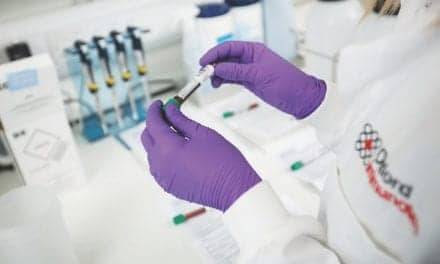Thermo Fisher Scientific, Carlsbad, Calif, has signed a companion diagnostic (CDx) agreement with Hengrui Therapeutics (HTI), Princeton, NJ, a US subsidiary of Chinese pharmaceutical company Jiangsu Hengrui Medicine (JHM), to develop a CDx that will leverage the Oncomine Precision Assay, which runs on the new Ion Torrent Genexus System. Once commercialized, the CDx will be used to identify non-small cell lung cancer (NSCLC) patients who may be eligible for pyrotinib, JHM’s novel, irreversible pan-HER2 tyrosine kinase inhibitor. HER2 mutations are present in about 4% of patients with NSCLC, yet there is currently no targeted therapy approved by the FDA for patients with HER2-mutated NSCLC.1 HTI recently released results from a phase 2 clinical trial demonstrating that pyrotinib showed promising antitumor activity in patients with HER2-mutant advanced NSCLC who were previously treated with chemotherapy. The drug received conditional approval in China for the treatment of HER2-positive, advanced, or metastatic breast cancer in chemotherapy-treated patients in 2018 based on positive phase 2 clinical trial results and full approval in 2020 based on two successful phase 3 studies. HTI’s global clinical trial program for pyrotinib is currently in phase 3 clinical trials, with studies underway in China, Europe, and the United States. “An approved targeted therapy for patients with HER2-mutated non-small cell lung cancer could save thousands of lives,” says Lianshan Zhang, PhD, Research & Development president of JHM. “We are excited to partner with Thermo Fisher on a companion diagnostic that will make it easier for clinicians to identify patients who may benefit from pyrotinib, helping us broaden participation in clinical trials and make precision medicine available for more patients.” Under the terms of the agreement, Thermo Fisher will retain rights to commercialize the test globally and will seek approval from regulatory agencies. The company has previously announced a CDx agreement that also leverages the Oncomine Precision Assay for the Genexus System. In June the FDA granted the assay Breakthrough Device Designation to identify isocitrate dehydrogenase 1 and 2 (IDH1 and IDH2) mutations in low-grade glioma patients. “We are seeing strong demand from our pharmaceutical partners for our NGS solutions,” says Garret Hampton, president of clinical next-generation sequencing and oncology at Thermo Fisher Scientific. “The Oncomine Precision Assay for the Genexus System is designed to comply with evolving regulations, such as those currently in development in China and Europe. It can be deployed to prospectively test and enroll clinical trial participants as well as for retrospective analysis of local laboratory tests used for clinical trial enrollment. It is the ideal solution to support trial programs on a global scale.” The Oncomine Precision Assay can detect more than 50 cancer-related biomarkers from formalin-fixed paraffin-embedded (FFPE) tumor tissues or liquid biopsy specimens. It is designed to run on the Genexus System, a distinctive NGS platform that features an automated workflow with a one-day turnaround time and low sample requirements for detection of both DNA and RNA variants. Currently, the integrated sequencer and assay are labeled for research use only. For more information, visit Thermo Fisher Scientific. Reference 1. Garrido-Castro AC, Felip E. HER2 driven non-small cell lung cancer (NSCLC): potential therapeutic approaches. Transl Lung Cancer Res. 2013;2(2):122-127. doi: 10.3978/j.issn.2218-6751.2013.02.02. Featured image: Non-squamous non-small cell lung carcinoma (Wikimedia)
Thermo Fisher, Hengrui Therapeutics to Develop CDx for NSCLC





